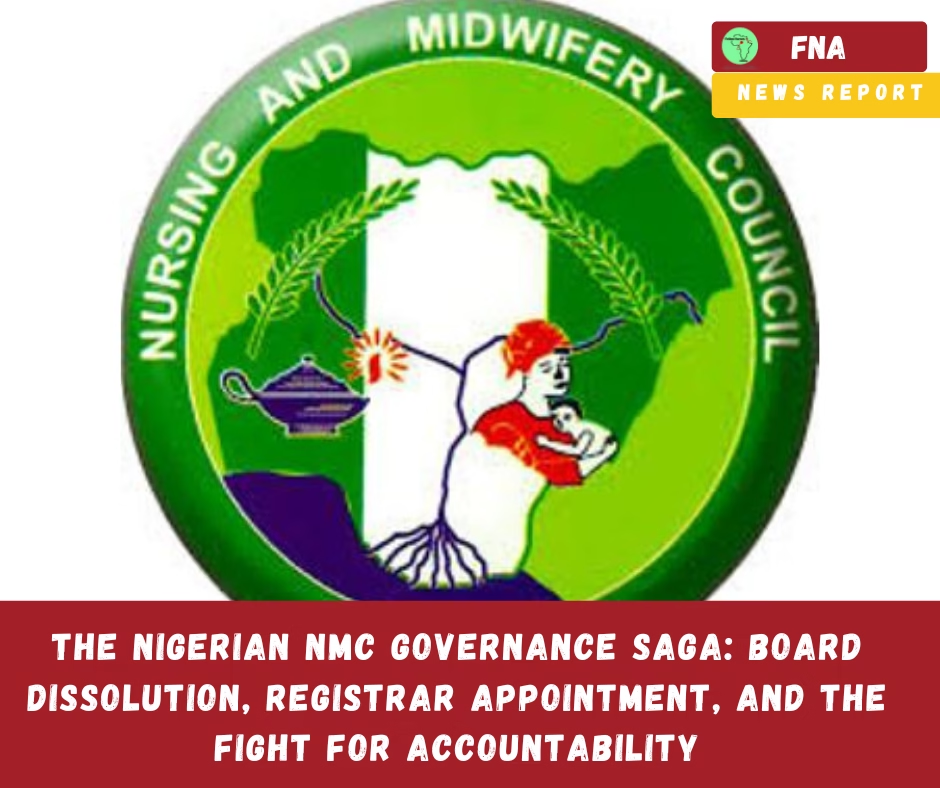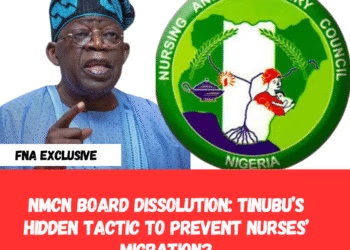Fellow Nurses Africa News Report | 9 July, 2025
Nigerian NMC Governance Crisis: Board Dissolution, Registrar Appointment Controversy, and Calls for Reform
The Nursing and Midwifery Council of Nigeria (NMCN) stands at a critical juncture, grappling with a governance crisis sparked by the dissolution of its governing board in June 2023 by President Bola Ahmed Tinubu, alongside other federal parastatals. This decision, aimed at restructuring government institutions, has left the NMCN without its essential policy-making body, raising questions about accountability and transparency.
The recent confirmation of Alhaji Ndagi Al-Hassan as the substantive Registrar/CEO on July 2, 2025, following his tenure as Acting Registrar, has intensified these concerns, with stakeholders alleging irregularities in the appointment process. Amid growing unrest among nurses, appeals for the board’s reconstitution have gone unanswered, and uncertainty surrounds the status of other dissolved boards.

This report explores the implications of these events for Nigeria’s nursing sector, balancing the optimism around Al-Hassan’s leadership with the urgent call for reform.
The NMCN’s Role and the Governance Vacuum
The NMCN, established under the Nursing and Midwifery (Registration etc.) Act, Cap. N143, Laws of the Federation of Nigeria, 2004, is the cornerstone of nursing and midwifery regulation in Nigeria. Tasked with ensuring high-quality education, maintaining professional standards, and enforcing discipline, the council relies on its 19-member governing board—appointed by the Federal Government on the recommendation of the Federal Ministry of Health—to set policies on accreditation, curriculum development, and regulatory guidelines. The Registrar, as the chief executive, implements these policies under the board’s oversight.
The dissolution of the board in June 2023, as part of President Tinubu’s administrative overhaul, has left the NMCN without this critical layer of governance. The absence of the board, which includes nurse educators, representatives from the National Association of Nigeria Nurses and Midwives (NANNM), and public interest members, has stalled policy formulation and accreditation efforts. This vacuum has exacerbated systemic challenges in the profession. The lack of board advocacy has left issues like low wages—48% of nurses earn between N25,000 and N50,000 monthly, quackery and unsafe working conditions unaddressed, fueling discontent within the profession.
The Registrar Appointment: A Flashpoint of Controversy
On July 2, 2025, President Tinubu confirmed Alhaji Ndagi Al-Hassan as the substantive Registrar/CEO of the NMCN for a four-year term, effective May 19, 2025, following his role as Acting Registrar. The announcement, formalized by a letter from the Coordinating Minister of Health and Social Welfare, Prof. Ali Pate, was met with praise from some quarters. Many nurses lauded Al-Hassan’s “inspiring leadership,”
However, the appointment has sparked significant controversy, primarily due to the absence of a governing board. A nurse leader, speaking anonymously to Fellow Nurses Africa, alleged that approximately 25 to 30 candidates applied for the Registrar position and were shortlisted for interviews. “We were never contacted about the results,” the leader stated. “We only learned through media reports that Al-Hassan had been appointed. How was this decision made without a board to provide oversight?” These allegations, unverified but reflective of widespread sentiment, underscore concerns about transparency, as the Nursing and Midwifery Registration Act mandates board involvement in major decisions, including appointments.
Another stakeholder, also speaking on condition of anonymity, acknowledged Al-Hassan’s experience, gained while working under former Registrar Dr. Faruk Umar Abubakar. “His capability isn’t in question,” the stakeholder told Fellow Nurses Africa. “But we wonder if his permanent appointment was solely based on Prof. Pate’s recommendation or influenced by other factors.” These concerns echo a 2024 lawsuit filed by the Nursing Group Admin (NGA), representing 153 nurses, which challenged the NMCN’s verification guidelines as unlawful due to violations of right to freedom of migration for nurses as well as the lack of board authorization. The appointment, made without board oversight, risks further eroding trust in the council’s governance.
Appeals for Board Reconstitution: A Cry for Change
The absence of the NMCN board has prompted urgent appeals from the nursing community. A nurse leader, speaking anonymously, revealed to Fellow Nurses Africa that multiple letters have been sent to the Federal Ministry of Health requesting the board’s reconstitution, but these efforts have yielded no response. “We are pleading with President Tinubu to act swiftly and restore the board,” the leader said, emphasizing its role in ensuring accountable and representative governance. “Without it, decisions lack the legitimacy and balance that nurses deserve.” This heartfelt plea reflects the frustration of a profession grappling with systemic challenges, from low wages to a nurse-to-patient ratio of 1:1,160, far below global standards.
The uncertainty extends beyond the NMCN. It remains unclear whether the boards of other government agencies and parastatals dissolved in 2023 have been reconstituted. leaving stakeholders in a state of limbo. This lack of clarity amplifies concerns about governance consistency across Nigeria’s public sector.
Implications for Nigeria’s Nursing Sector
The board’s dissolution and the controversial appointment have far-reaching consequences for nursing regulation and practice:
-
Policy Stagnation: Without a board, the NMCN struggles to update curricula, accredit training institutions, or address emerging healthcare needs and hinders efforts to combat quackery, which threatens patient safety.
-
Legal and Operational Risks: The absence of board oversight has led to accusations of unlawful actions, such as the 2024 verification guidelines requiring two years of post-qualification experience and letters of good standing. These policies, perceived as restrictive, sparked protests in Abuja and Lagos, with nurses arguing they infringe on their rights to career mobility.
-
Nurse Morale and Retention: The lack of board advocacy has left nurses feeling unsupported amid low wages, unsafe workplaces, and staffing shortages.
-
Professional Standards at Risk: Without a board to enforce accreditation and disciplinary measures, the NMCN’s ability to maintain high standards is compromised, potentially allowing unqualified practitioners to operate.
Al-Hassan’s Leadership: Promise Amid Challenges
Despite the controversy, Al-Hassan’s track record offers hope. As Acting Registrar, he oversaw the induction of 365 foreign-trained nurses just this year, emphasizing ethical practice and global standards amongst other innovations. Some view his appointment as a sign of “progress and reform.”
However, without a board, Al-Hassan’s ability to address systemic issues is limited. The verification guidelines, issued during his acting tenure, have alienated nurses, particularly the requirement for letters of good standing from CEOs, often doctors, which raises concerns about professional autonomy, especially for female nurses (87% of the workforce).
A Path Forward: Recommendations for Reform
The NMCN governance saga underscores the need for immediate action to restore trust and strengthen Nigeria’s nursing sector. The Federal Government should consider the following:
-
Reconstitute the NMCN Board: Appointing a diverse, representative board is critical to restoring transparent governance and addressing stakeholder concerns, as urged by nurse leaders.
-
Investigate the Appointment Process: Clarify the circumstances of Al-Hassan’s appointment, addressing allegations of opacity and ensuring adherence to the council’s enabling act.
-
Revise Verification Policies: Engage NANNM and nurses to develop guidelines that balance regulatory needs with career mobility, reducing barriers to international opportunities.
-
Address Nurse Welfare: Prioritize competitive salaries, safer workplaces, and adequate staffing to curb emigration and bolster healthcare delivery.
-
Clarify Status of Other Boards: Provide updates on the reconstitution of other dissolved boards to ensure consistency in governance reforms.
Conclusion
Nigeria’s nurses, often hailed as “incredible warriors” during crises like COVID-19, deserve a governance framework that reflects their dedication and sacrifices. The dissolution of the NMCN board and the controversial appointment of Alhaji Ndagi Al-Hassan have exposed deep-seated governance challenges, yet they also present an opportunity for reform.
By reinstating the board and addressing nurses’ grievances, President Tinubu and the Federal Ministry of Health can restore trust and ensure the NMCN fulfills its mandate to advance nursing and midwifery. As Nigeria strives for Universal Health Coverage, the voices of its nurses must guide the path to a stronger, more equitable healthcare system.
Fellow Nurses Africa is the independent voice of African nursing, we educate, inform and support the nursing profession.










